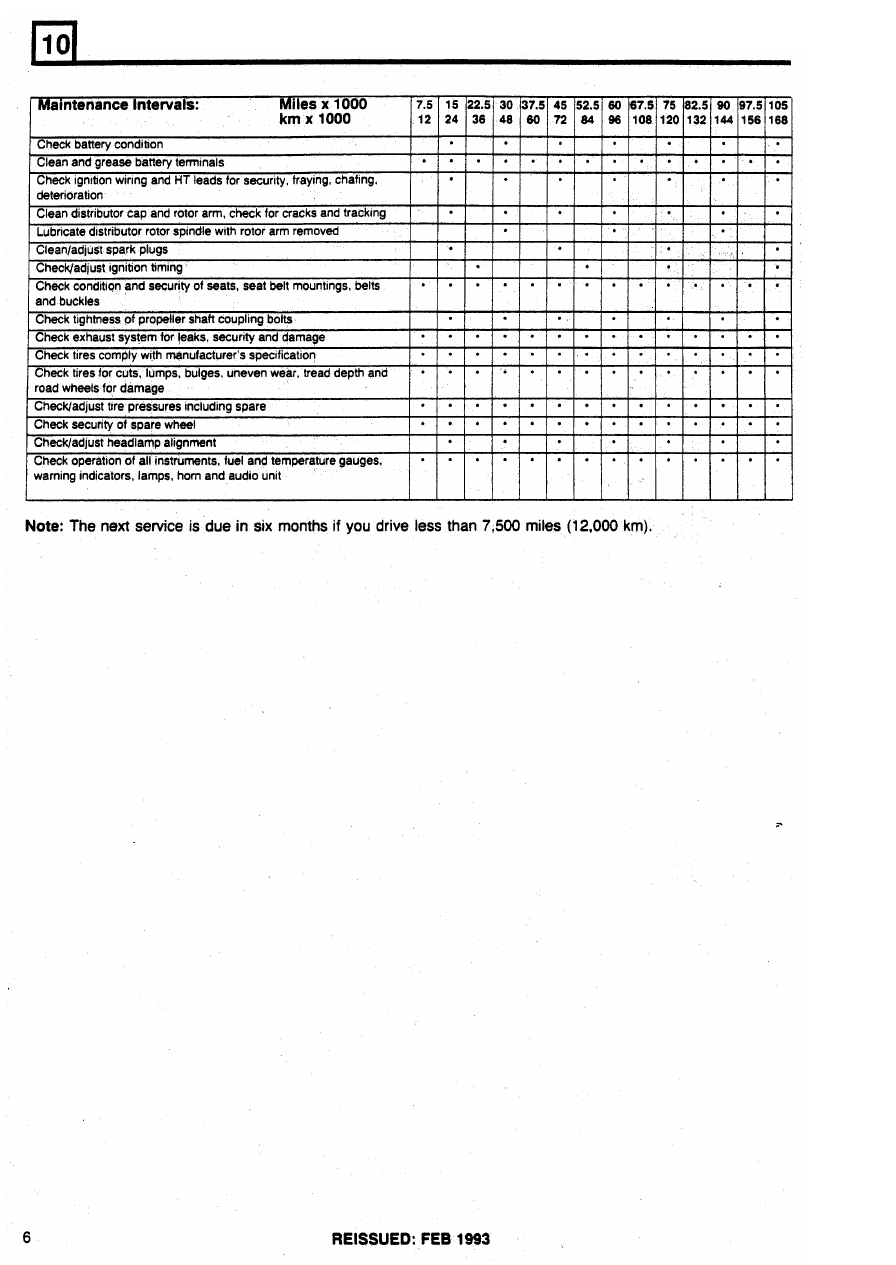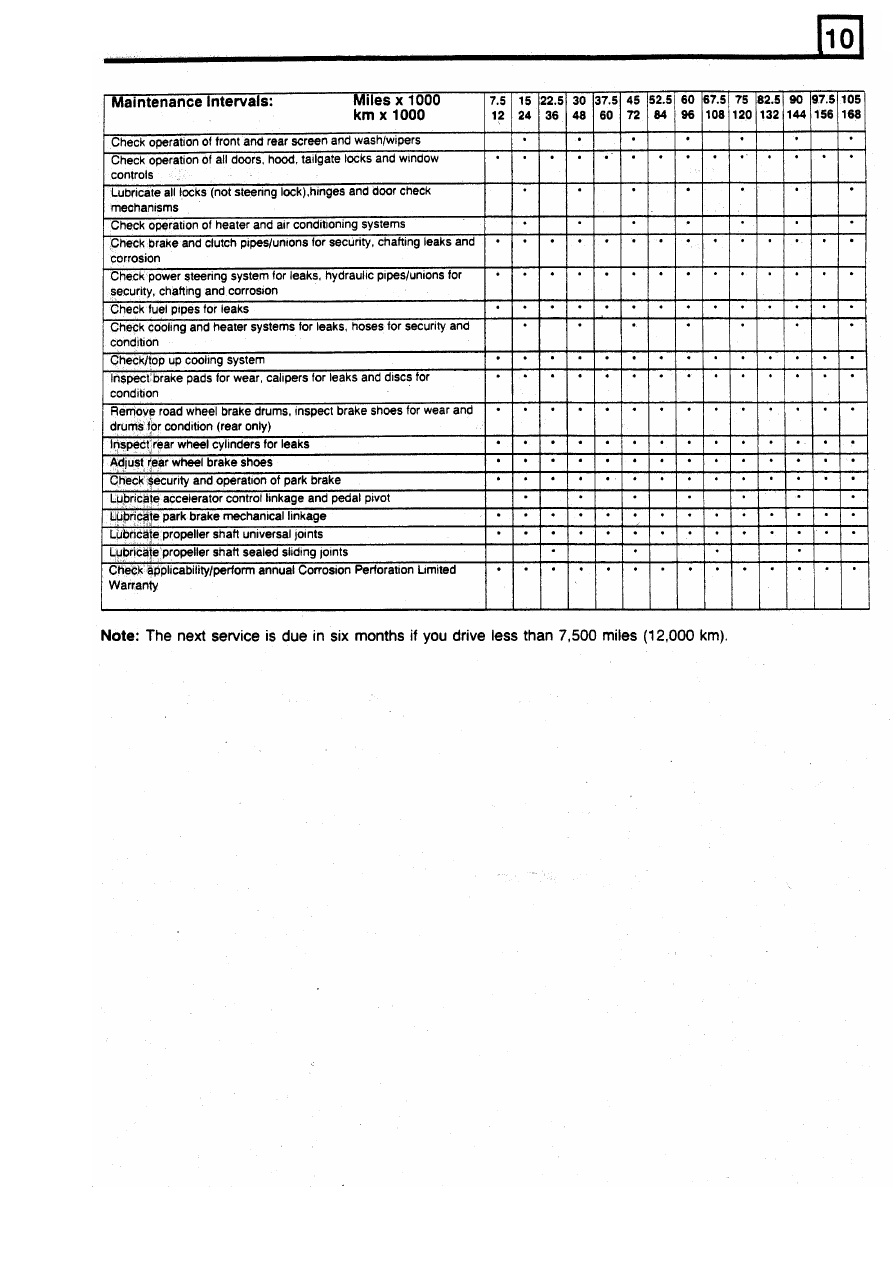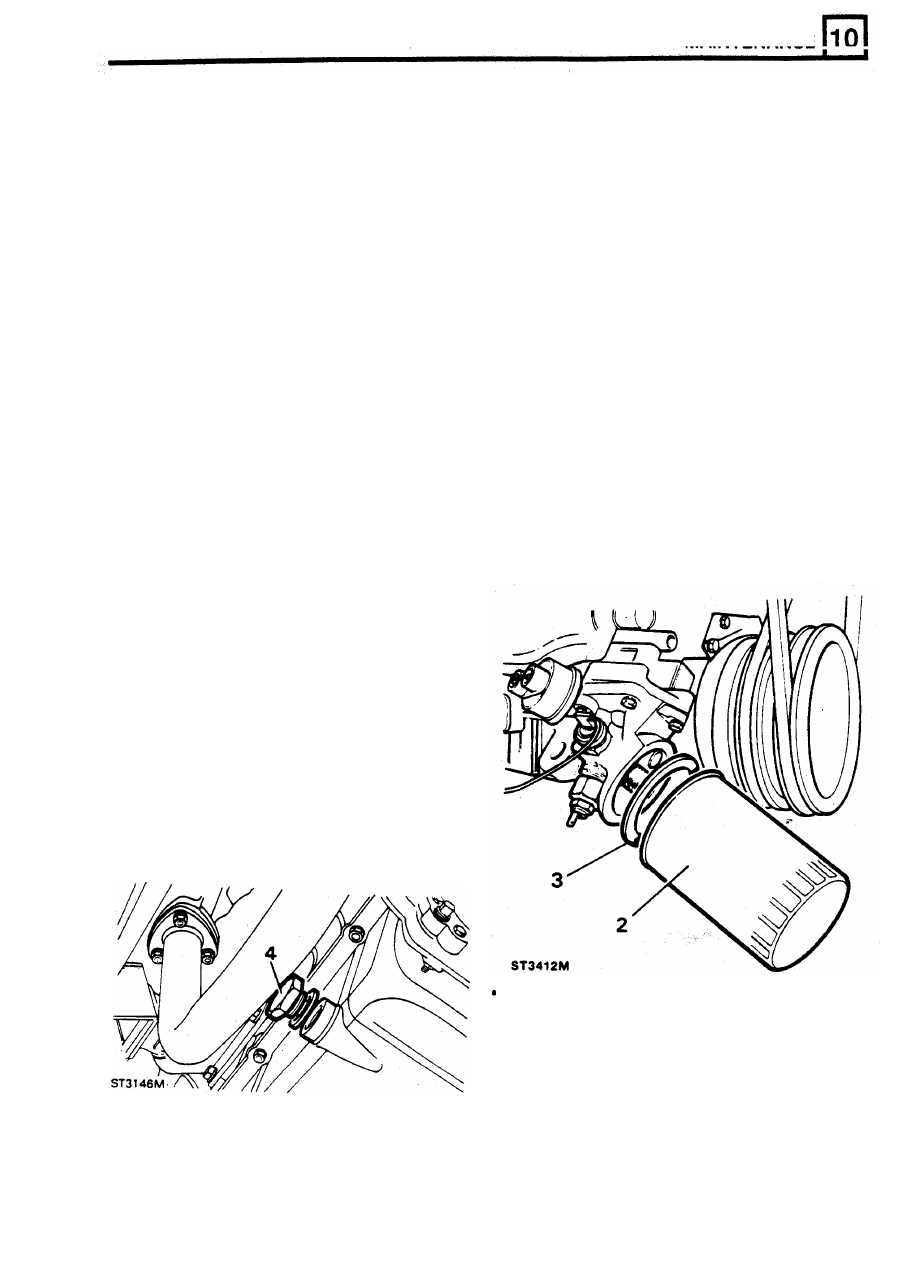Defender (1993+). Manual — part 10

MAINTENANCE

MAINTENANCE
REISSUED: FEB
1993
7
MAINTENANCE
It is recommended that:
At
15,000 mile (24,000 km) intervals or every 18 months, whichever is the sooner, the hydraulic brake and
clutch fluid should be completely renewed.
At
37,500 mile (60,000 km) intervals or every 3 years, which ever is the sooner, all hydraulic brake and fluid,
seals and flexible hoses should be renewed, all working surfaces of the master cylinder, wheel cylinders and
caliper cylinders should be examined and renewed where necessary.
At
37,500 mile (60,000 km) intervals remove all suspension dampers, test for correct operation, refit or renew
as necessary.
At
two
year intervals or at the onset of the second winter, the cooling system should be drained, flushed and
refilled with the required water and anti-freeze solution.
The battery electrolyte level should be checked and topped up if required
once a year in tropical and sub-tropical climates
once every three years in temperate climates.
NOTE: Climatic and operating conditions affect maintenance intervals to
a
large extent: in many cases,
therefore, the determination of such intervals must be left to the good judgement of the owner or to
advice from an Authorised Dealer but the recommendations
will serve as a firm basis for maintenance
work.
Vehicles operating under arduous conditions will require more frequent servicing, therefore, at a minimum, the
Maintenance intervals should be reduced by half.
For low mileage vehicles it is recommended that the maintenance is carried out at
6
months intervals.
The owner need not perform recommended maintenance
in
order
to
maintain the emission warranty or
manufacturer recall liability.
SPECIAL OPERATING CONDITIONS
When the vehicle is operated in extremely arduous conditions
or
on dusty, wet or muddy terrain, more frequent
attention should
be
paid to all servicing requirements.
ADDITIONAL DAILY O R WEEKLY ATTENTION DEPENDING ON OPERATING CONDITIONS:
Check/top-up transfer box
oil.
Check steering rubber boots for security and condition. Renew
if
damaged.
Check brake fluid level: consult your Dealer if any fluid loss
is
suspected.
Clean brake discs and calipers.
Lubricate front and rear propeller shaft grease points and front sliding joint. Under tropical or severe conditions,
particularly where sand
is
encountered, the sliding joints must
be
lubricated very frequently
to
prevent ingress
of abrasive material.
Every week and every maintenance inspection check tyre pressures and inspect tyre treads and side walls.
Under arduous cross-country conditions the tyre pressures should
be
checked much more frequently, even to
the extent of a daily check.
MONTHLY
Renew gearbox oil.
Renew transfer box oil.
Check air cleaner element and renew every 6 months or as necessary.
8
REISSUED: FEB 1993

MAINTENANCE
LUBRlCATlON
5.
Clean the outside of the oil filler cap, remove
it
from the rocker cover and clean the inside.
This first part of the maintenance section covers
6.
Pour in the correct quantity of new oil of the
renewal of lubricating oils for the major units of the
correct grade from a sealed container to the
vehicle
and
other
components
that
require
high mark on the dipstick and firmly replace
lubrication, as detailed in the 'MAINTENANCE
the filler cap. Reconnect the battery.
SCHEDULES'
.
Refer to 'SECTION 09' for
capacities and recommended lubricants.
Vehicles operating under severe conditions of dust,
sand, mud and water should have the oils changed
CAUTION: The engine oil filter must not be
and lubrication carried out at more frequent intervals
removed whilst the sump is empty, otherwise the
than that recommended in the maintenance
oil pump may have to be primed.
schedules.
Draining of used oil should take place after a run
1.
Place an oil tray under the engine.
when the oil is warm. Always clean the drain and
2.
Unscrew the filter anti-clockwise, using a strap
filler-level plugs before removing. In the interests of
spanner as necessary.
safety disconnect the vehicle battery
to
prevent the
3.
Smear a little clean engine oil on the rubber
engine being started and the vehicle moved
washer of the new filter, and half fill with fresh
inadvertently, while oil changing is taking place.
oil. Then screw the filter on clockwise until the
Allow as much time as possible for the oil to drain
rubber sealing ring touches the machined
completely except where blown sand
or
dirt can
face, then tighten a further half turn by hand
enter the drain holes.
In
these conditions clean and
only. Do not overtighten.
refit the drain plugs immediately the main bulk of oil
4.
Run the engine and check for leaks from the
has drained.
filter. Stop the engine, allow the oil
to
run
Where possible, always refill with oil of the make
back into the sump for a few minutes, then
and specification recommended in the lubrication
check the oil level again and top up if
charts and from sealed containers.
necessary.
WARNING: See ENGINE OILS under POISONOUS
RENEW OIL FILTER
SUBSTANCES - SECTION 01. INTRODUCTION.
RENEW ENGINE OIL
Drain and refill engine
1.
Drive vehicle to level ground.
2.
Run the engine to warm the oil; switch
off
the
ignition and disconnect the battery for safety.
3.
Place an oil tray under the drain plug.
4.
Remove the drain plug in the bottom
of
the
sump. Allow oil
to
drain away completely and
replace the plug and tighten to the correct
torque.
REISSUED: FEB 1993
9

Нет комментариевНе стесняйтесь поделиться с нами вашим ценным мнением.
Текст